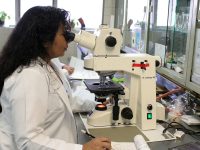
Photo: TAU. Audiovisual Workshop of the University of Valencia
One of the most essential goals of the University of Valencia is promoting prestigious research with international impact to contribute to the development of our society. The publication of research results needs to respond, now more than ever, to assessment and editorial standards in order to guarantee a high quality level.
The University of Valencia boasts about 3,000 papers published by its professors and researchers in impact journals. The effort to publish in the most prominent scientific journals is clear, and the seal of quality of our research. In fields such as chemistry, the University of Valencia is the second Spanish university by number of scientific papers and our research groups in physics and astronomy are involved in the top international research networks.
But the impact of the scientific production of a university needs to be measured also by the prestige of its publications, which involves guaranteeing and adapting to a series of very demanding standards when publishing a journal. These standards require a review system that prioritises content quality and rigour, reviewer independence and absolute transparency of the editorial process, based on the ethical commitment of the editor. In this sense, the road taken three years ago by Mètode with the creation of the Mètode Science Studies Journal annual review has now been rewarded for the effort with the inclusion of the journal in the Scopus index, one of the most prestigious international databases for scientific research contents.
«If Mètode has proved something during recent years, it is the fact that there is a different way to communicate science»
In order to advance the inclusion of the journal in the main scientific publications databases, Mètode had to reorganise concurrently with its quarterly publication and digital content, all under science popularisation. In Mètode Science Studies Journal, without sacrificing Mètode’s spirit and imprint, the journal took English as a vehicular language and subjected the articles to a review process by external experts, respecting the anonymity of the author and reviewers during the entire process. In this sense, we need to stress the effort made to develop a good practices code, following the recommendations of the Committee on Publication Ethics (COPE).
The Scopus reviewers highlighted the fact that Mètode is not your usual scientific journal. If Mètode has proved something during recent years, it is the fact that there is a different way to communicate science, where rigour and content quality is not incompatible with a detailed and compelling layout. A journal open to all the fields of science, with a universal vocation, which in the last three years has made an important effort to open its pages to international researchers and to diversify and imbue the publication with the accuracy required by academic content.
Scopus is the newest in a list of impact indexes in which Mètode Science Studies Journal is included. It is also present in national and international databases and directories such as Latindex, MIAR or DOAJ. The journal has committed itself firmly to open access content in its website, answering to the responsibility of a publication from a public university, which must communicate science to give back to society.
Seven years ago, as the Vice-Principal for Research and Science Policy, I stated the importance of Mètode to communicate the work of our university community to the public. To do so, I quoted the philosopher George Berkeley, «esse est percipi» or «to be is to be perceived». We can apply this motto to research. It is the duty of universities to disseminate our research not only through scientific papers, but also through the implementation of quality, accuracy and innovation structures that bring research and results closer to a public as broad and diverse as possible. And Mètode learned how to establish itself, thanks to the excellent work of its director, Martí Domínguez, and all the members of its editorial office. It became a referent for science communication, and now a space for the communication of research and the reflection on all fields of science. A space to bring the work of the university to the foreground, to create a bridge not only between science and society, but also between different fields of science.




